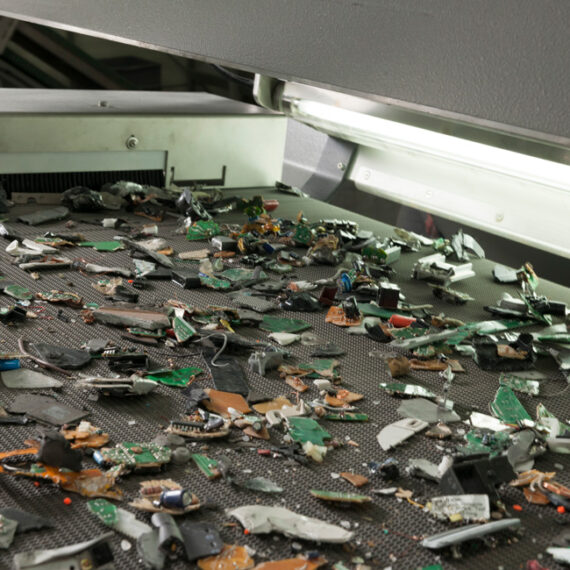
Why Is It Important to Recycle E-Waste Separately from Other Waste?
Do you ever wonder what happens to your old electronics when you dispose of them with regular waste? The world generates over 62 million metric tons of e-waste yearly! This rapidly growing waste stream significantly threatens the environment and human health. Unfortunately, many people are unaware of the importance of proper e-waste disposal. When electronic waste is not recycled separately from other waste, it can lead to pollution, health hazards, and loss of valuable resources. Let’s explore why it is crucial to recycle electronic waste separately and the benefits it brings.
Importance of Separating E-Waste

Environmental Protection
E-waste contains hazardous materials like lead, mercury, cadmium, and brominated flame retardants. When disposed of with regular waste, these life-threatening substances can leach into the soil and water, causing severe environmental pollution. This contamination can risk plant and animal life and eventually make its way into the human food chain, posing significant health risks. Recycling e-waste separately ensures these harmful components are securely managed and do not contaminate the environment.
Resource Recovery
Electronic devices are rich in valuable materials such as copper, gold, silver, and rare earth elements. These materials are finite and require extensive mining to obtain. When e-waste is recycled separately, these precious materials can be extracted & reused to manufacture new products. This process reduces the need for mining raw materials, conserving natural resources and reducing environmental damage. In fact, recycling 1 million laptops can save the energy equivalent to the electricity used by 3,657 U.S. homes in a year.
Health and Safety
Improper e-waste disposal can pose significant health risks to waste handlers and the general public. Exposure to toxic chemicals from e-waste can lead to severe health issues, including skin disorders, respiratory problems, and even cancer. By recycling e-waste separately, we minimize these health hazards, ensuring a safer environment for everyone involved in waste management.
Legal Compliance
Many countries have regulations and laws governing the disposal of e-waste. These laws often mandate the separate collection and recycling of electronic waste to prevent environmental contamination and promote resource recovery. Adhering to these regulations helps avoid legal penalties and supports sustainable waste management practices. For instance, the European Union’s Waste Electrical and Electronic Equipment (WEEE) Directive sets collection, recycling, and recovery targets for all electronic goods.
Consequences of Failing to Separate E-Waste
1. Environmental Contamination: When e-waste is disposed of with regular trash, hazardous substances can leak into the environment. This contamination can affect soil and water quality, harming plants, animals, and humans. Over time, these pollutants can accumulate, leading to long-term environmental damage.
2. Loss of Valuable Resources: Mixing e-waste with general waste makes it difficult to recover valuable materials. As a result, these precious resources are lost, increasing the demand for new raw materials. This depletes natural resources and contributes to environmental degradation through mining and extraction activities.
3. Increased Greenhouse Gas Emissions: Improper e-waste disposal can lead to higher greenhouse gas emissions. When e-waste is incinerated or left to decompose in landfills, it can release harmful gases into the atmosphere. On the other hand, proper recycling reduces the need for energy-intensive raw material extraction and processing, thereby lowering emissions.
4. Health Hazards: E-waste that is not properly managed can expose waste workers and the public to toxic substances. Informal recycling practices, such as burning electronic components to recover metals, release harmful chemicals into the air. These practices pose significant health risks to individuals and communities.
5. Economic Costs: Failing to separate e-waste can lead to higher waste management costs. Contaminated waste streams are more challenging to process and recycle, increasing operational expenses. Additionally, non-compliance with e-waste regulations can result in fines and legal penalties for businesses and municipalities.
Conclusion
Recycling e-waste separately from other waste is essential for protecting our environment, safeguarding human health, conserving resources, and ensuring efficient recycling processes. As consumers, we must be diligent in disposing of our electronic devices responsibly and supporting initiatives that promote proper e-waste management. By doing so, we contribute to a healthier planet and a sustainable future for all.
How You Can Help
• Proper Disposal: Take your e-waste to designated recycling centers or collection events.
• Educate Yourself and Others: Spread awareness about the importance of e-waste recycling.
• Support Legislation: Advocate for policies that promote responsible e-waste management and recycling.
Together, we can significantly reduce the harmful effects of e-waste and create a more sustainable world.
Read Our More Blogs:
Impact of E-Waste on Developing Countries
E-Waste Management in Developed vs. Developing Countries







